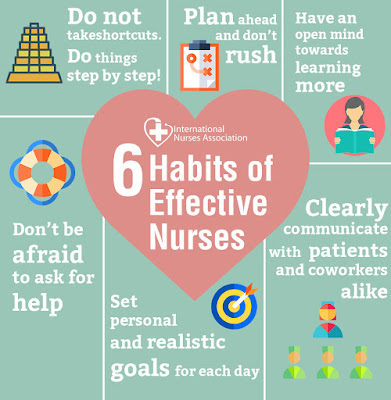Nursing
is one of the toughest jobs there are. Anyone can be a nurse, but there are
certain qualities that make you from a just a nurse to a successful nurse with
a well defined career in the field. To care for the sick, to be with their
families, to put in long hours is demanding and not everyone’s cup of tea.
Although it is one profession that always has demand due to the shortage of
dedicated workforce, growing in the industry can be a challenge.
What
defines an effective and successful nurse? Unlike other industries where
monetary benefits and the role define the success of an individual, the success
of a nurse is defined by the quality of care delivered to the patient. An
effective nurse works in two ways: as an asset to the healthcare setup and as
an effective aid to the patient under her care. The effectiveness of a nurse is
seen in how she caters to every little need of the patient and duly
accomplishes her responsibilities towards the healthcare setup.
There are no secret tips for nurses to be
effective at their work, just a few handy tips that eventually turn into a
habit as they perform their duties every day.
1.
Do not take shortcuts, its got to be well planned: For a good nurse,
there aren’t any shortcuts, and every task needs to be a step by step process.
Skipping steps overall impact the quality of care delivered to the patient and
hence a good nurse follows every step to the tee.
2.
Plan ahead and do not rush: Nursing is a
stressful profession, and requires a calm and well processed mind to be
prepared for every other emergency. The most successful nurses manage to keep
their cool even through a mad day and do it all with a big pleasant smile.
3.
Have an open mind towards learning more: Like doctors, the
learning never stops for nurses as well. A good nurse always goes to work with
an open mind and is always willing to learn something new, even if it means a
new way of doing something routine.
4.
Clearly communicate with patients and co workers alike: Communication is a
key for success in every career and nursing is no exception. Nurses involves
being able to communicate with different levels of people right from the
hospital staff to doctors to patients and to relatives.
5.
Set personal and realistic goals for each day: Have an objective
or a goal keeps one motivated at work. Having goals helps them keep a check on
their everyday productivity and measure the targets against the achievements.
6.
Don't be afraid to ask for help: Asking for help
doesn't mean you don't know, it just means you want to do something perfectly.
As a nurse, it is always good to ask if you are unsure about how something
should be done, even if it means asking repeatedly till you are clear. Nursing
profession cannot afford too many mistakes particularly by the nurses, since
lives are involved and hence, there should be no room for ambiguity.

Comments
Post a Comment